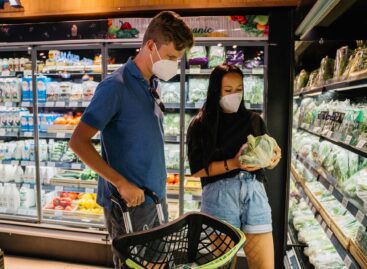DélKertész: Tax change could give a boost to Hungarian vegetables
Hungarian vegetable producers could become more competitive and the agricultural sector could become even whiter with the introduction of the reverse VAT. This method would be the quickest and most effective way to curb VAT fraud affecting the sector, and the commercial position of domestic goods would also improve, according to the summary of DélKertÉSZ, which brings together 450 Szentes producers. Szentes producers had a good season: in the first three quarters of 2025, they sold 53.5 thousand tons of vegetables, which represents an increase of 700 tons on an annual basis. Sales revenue increased by 260 million forints to 16.5 billion forints. Next year, they would boost exports with new investments, greenhouses and the construction of foil blocks.

This season has brought stable results for DélKertÉSZ, which brings together 450 vegetable producers from Szentes. Although the quantity produced and the producer price in the first half of the year were lower than last year, the favorable weather conditions of the autumn period boosted the results, according to the cooperative’s summary.
The autumn period was strong
“The members of the cooperative, who mainly grow tomatoes and peppers, sold 53.5 thousand tons of vegetables in the first three quarters of 2025, which represents an increase of 700 tons on an annual basis. Sales revenue increased by 260 million forints, to nearly 16.5 billion forints. In the so-called fresh market products – peppers and tomatoes – 24.4 thousand tons were sold. In the first half of this year, the quantity produced and the producer price were also lower than in the same period of the previous year, however, this year the period from August to October provided favorable conditions, so about 2,500 tons more vegetables were imported on an annual basis,” said Sándor Nagypéter, president of DélKerTÉSZ.
Producer prices decreased by 5 percent for peppers and tomatoes due to the base effect, but there was a tomato specialty where the decrease was as high as 33 percent. However, in the case of hot peppers, producer prices increased by 15 percent due to the increasing export. The turnover of foreign sales increased by 25 million forints on an annual basis, reaching 2.5 billion forints.
Sándor Nagypéter added that due to the favorable autumn weather, there was a significant oversupply of Hungarian vegetables; for example, at DélkerTÉSZ, producers imported double the reported quantity. TÉSZ’s strong logistics and packaging capacity played a key role in serving producers: in order to increase efficiency and competitiveness, a logistics hall worth 3 billion forints was opened in Szentes.
Reverse VAT could increase producers’ competitiveness
In addition to investments, the competitiveness of Hungarian producers is also significantly influenced by the issue of VAT on vegetables and fruit. According to Sándor Nagypéter, one of the most important issues for the sector would be the elimination of VAT fraud. The expert highlighted that in the case of free market trade, the proportion of black trade is high and there is great import pressure, therefore, instead of reducing the 27 percent VAT, DélKerTÉSZ believes that reverse VAT could be a long-term solution – similar to grain. In the case of vegetables and fruits, reducing the VAT rate to 5 percent would only bring temporary savings for consumers. The introduction of the reverse charge VAT also requires EU support, but this step would also correct the import price, so there would not be such a big difference between the price of Hungarian and foreign products, and it could also help consumer prices in the medium term.
The margin stop is coming
Vegetable consumption could also be boosted by the government extending and expanding the margin stop, so it will apply to 14 new product groups, including tomatoes and green peppers. “The detailed rules have not yet been published, so we do not yet know exactly which products in the pepper and tomato product category it will apply to, but overall the margin freeze may benefit consumption, as the gap between the prices of foreign and Hungarian vegetables will be smaller, meaning more people will have access to these products,” added Sándor Nagypéter.
According to the expert, an important question is what to expect after the end of February. There are two schools of thought here: one is that in the event of an extension, Hungarian vegetables may continue to be more attractive, which could benefit consumption. According to the other direction, the action scenario regarding vegetables and fruits may change.
Related news
OKSZ on the extension of the margin stop decree
🎧 Hallgasd a cikket: Lejátszás Szünet Folytatás Leállítás Nyelv: Auto…
Read more >Trade union: the elimination of the margin cap could lead to another price explosion for basic foodstuffs
🎧 Hallgasd a cikket: Lejátszás Szünet Folytatás Leállítás Nyelv: Auto…
Read more >OKSZ: Retail margin cap has lost its purpose – government decision due in February
🎧 Hallgasd a cikket: Lejátszás Szünet Folytatás Leállítás Nyelv: Auto…
Read more >Related news
Nestlé to sell remaining ice-cream assets but commits to Froneri venture
🎧 Hallgasd a cikket: Lejátszás Szünet Folytatás Leállítás Nyelv: Auto…
Read more >Lidl guarantees fairer prices for cocoa farmers
🎧 Hallgasd a cikket: Lejátszás Szünet Folytatás Leállítás Nyelv: Auto…
Read more >40 secure jobs, sustainable solutions – new BURGER KING® in Csepel
🎧 Hallgasd a cikket: Lejátszás Szünet Folytatás Leállítás Nyelv: Auto…
Read more >








